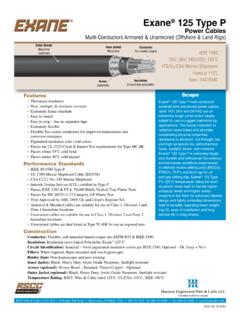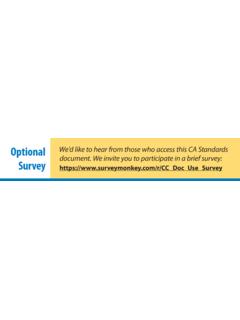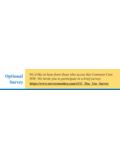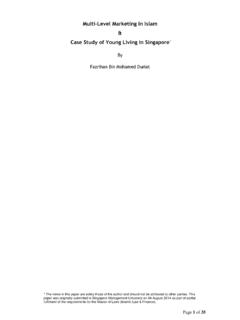Transcription of Older Struggling Readers: What Works?
1 Older Struggling Readers: what Works? The BIG Picture Many middle and high schools report large numbers of students who are reading 3, 4, and 5. grade levels below their expected level. It is naive to think that these extreme deficits in basic skills will be remediated in a traditional core English class, silent reading or via content area reading. My read of the evidence indicates that there are NO QUICK FIXES but it is indeed possible to significantly boost the literacy of Struggling readers in middle school, high school, and beyond IF we allocate the time, training, and resources required to do the it is NEVER. too late, only more difficult with Older students for whom the benefits of literacy are not yet a reality. The research evidence and common sense indicate there are a few essential conditions that we must directly address to successfully impact problems associated with Older Struggling readers.
2 Key variables include: 1) TIME - additional instructional time must be carved out of the day, this can take all kinds of forms ( a scheduled elective, a core reading class, X-age tutoring in the learning center, summer school, after school, etc.). Most secondary schools w/significant reading problems have added a scheduled reading class as a required elective for students below a certain level. Intensive Instruction - 1 to 1 tutoring being the most intensive we know of, small homogeneous groups are next best; tutoring can be X-age, peer, paraeducators, volunteers as long as they are well trained & supported. Teaching is VERY interactive NOT work sheets! Curriculum that Works! - curriculum counts! there is no magic bullet but teachers need access to tools that work & support/training in their use, materials need to be research based and validated if to work with Older Struggling readers.
3 Practice - HUGE amounts of partner, group, silent, and home reading of instructional and independent level books. There are no shortcuts - no quick fixes!! Student Self Advocacy - adolescents must be stake holders in their self-improvement. I. have found that if teachers give a good sales pitch and can deliver the goods that is half the battle, another key aspect is to have students chart their own progress daily and/or weekly - this kind of feedback is very motivating. It is also helpful to have students set their own Students must be clear, we can't do this to them - only with them !! Older Students with Serious Reading Difficulties 1.) Corrective Reading - SRA, Gary Johnson & Zig Engleman. (800) 662-5958, in No. Ca - Gary Parsons, (707) 575 - 7390. This is a total package program, based on direct instruction, it has scripted lesson plans, clear sequences, appropriate text/stories, built in regular assessment.
4 It is not pretty or creative but it does work ! Corrective Reading has a solid research base for adolescents (gr. 4 & up) who have not learned how to read well. No Ca. consultant, Sue Coleman (707) 538 - 4877, provides expert training and classroom coaching with CR. 2.) Language! - Jane Fell Green, Sopris West, ( , 800) 547-6747. A complete research based reading program designed for students grades 5 and up who are significantly behind in reading. Rooted in Slingerland multi-sensory instruction and applied linguistics, this program has everything you would need from explicit instructions, decodable text, language development, etc. Very thorough and quite impressive, recent studies with adolescents document the power of Language!, a 4 day training program is recommended to master the intricacies of effectively teaching the program. 3) Wilson Reading System - Barbara Wilson, (508) 865 - 5699, Another complete package, taking students from sounds to text, very systematic and explicit in design, excellent training available as well.
5 Based on Orton-Gillingham multi-sensory teaching methods, good data to support its use - including college age students. Very popular on the East Coast, Barbara Wilson is a former speech and language specialist who has pulled together a comprehensive remedial reading program for student Struggling Feldman's Biased Bibliography of Resources of Older Struggling Readers 1. language specialist who has pulled together a comprehensive remedial reading program for student Struggling readers. 4.) Auditory Discrimination in Depth ( LIPS Program) - Lindamood-Bell, (800) 233-1819, Available from Pro Ed in Austin TX. (512) 451-3246. ADD was created over 20 years ago by Pat & Charles Lindamood, was the first truly linguistic reading program to emphasize phonemic awareness, has solid evaluation data to support its effectiveness. As with all of the above programs, training in how to use ADD is critical to realize the full benefit.
6 5.) Boys Town Reading Program - Mary Curtis & Anne Marie Longo - (402) 498 - 1075, email Designed and validated for adolescents with reading difficulties the Boys Town Reading Program is based on Jean Chall's stages of reading development. The program has four courses that take about 16 weeks each if taught 5 days per week in 45-60 min sessions. The courses match reading levels as each student is assessed and placed at their level of instructional need. Norm referenced and curriculum based measures document significant gains, average gains for 36 weeks is more than two grade levels. 6.) REWARDS - Sopris West, , 800) 547-6747 Anita Archer & Mary Gleason's polysyllabic word reading curriculum that directly teaches students reading at 3rd- 5th grade level a generalizable strategy to successfully tackle big words, excellent research support - especially with Struggling readers.
7 Local evidence suggests 2-3 years growth in word reading!! This is a very parsimonious program. REWARDS PLUS - is a brand new (2003) extension program by the same authors. The program uses middle school social studies passages and provides excellent instruction and practice in: advanced decoding, vocabulary meanings, comprehension strategies, and summary writing - it is very cool! 7.) SIPPS (Systematic Instruction in Phonemic Awareness, Phonics, & Sight Words) - Developmental Studies Center - (510) 533-0213. Another excellent resource by Dr. John Shefelbine - excellent for gr. 3-5 in general ed. to systematically teach polysyllabic word reading and for Older students at any age who need the skills. 8.) Read Naturally - (800) 788-4085, , Designed and validated by long time Title One teacher and reading specialist Candyce Ihnot, Read Naturally is a fluency development program that is garnering rave reviews across the country.
8 It uses 3 research based strategies to build fluency: teacher modeling, repeated readings, progress monitoring in a simple yet effective format that kids love. Sold by the unit from .8 to grade/reading levels each with pre-recorded tapes to go with the reading selections. Since this is a practice - not a teaching program, it can be easily run by a kids love the reading Read Naturally is very nifty 9.) Soar to Success - Houghton- Mifflin - (888-892-2377) Soar to Success is based upon two strong aspects of successful reading intervention: reading books at your level, and using cognitive strategies of good readers - in this case, Reciprocal Teaching (summarize, predict, clarify, question). Soar is for students in grades 3-8 who are behind in reading - a very strong program BUT does not include decoding, so many students will need a program like REWARDS to supplement Soar - to provide the comprehensive intervention they need.
9 Soar is based on original research conducted in Ca. by Irene Boschken with assistance from J. David Cooper of Ball State. 10.) High Point - Hampton Brown - 800-333-3510. One of the 5 approved gr. 4-8 intervention programs for California - and is the only one aligned with the ELD. standards and approved for ELLs . It is very new, so the field testing and actual efficacy data is quite limited, but initial reactions have been very positive, especially for ELLs with serious literacy needs. 11.) Fast Track - Wright Group - - 800-523-2371. Another of the 5 approved CA interventions. Like High Point, limited field testing, but initial reactions are very positive. Time and more research will tell!! 12.) Teacher Developed Programs (see The Reading Teacher, vol. 49, no. 5 2 (1996) A Case Study of a Middle School Reading Disability, Morris, et al. or Educational Leadership, Ma.
10 1998, A Second Chance to Learn to Read, Showers, Joyce, et al. A teacher can put together an effective remedial reading program for adolescents who are seriously behind IF they have the time, background, support and materials to do These programs will end up looking much like Corrective Reading/Language/ Wilson/ ADD in terms of essential content ( reading at the students instructional level, sequential text/word/ letter/sound work , linking writing to spelling/reading, on-going assessment) but will be, perhaps, more creative and attuned to the individual either way it is the RESULTS that count!! Feldman's Biased Bibliography of Resources of Older Struggling Readers 2. Technology Based Reading Related Programs Note: Most of these programs have scant evidence to support their use, some have a degree of pre test/post test evaluation but not well controlled research.








